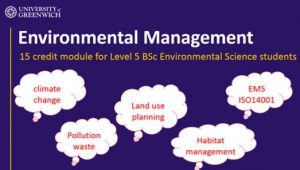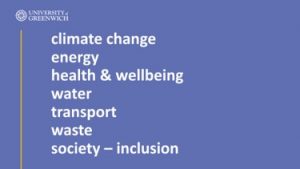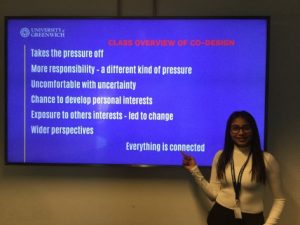Academia SIG Case Study: Including Students in University Course Module Design
Collaborative Assessment Design linked to the Medway Sustainable Development Goals Project presentation at Shift 2020: Effective learning relationships for genuine engagement and freedom to learn
Have you ever wondered how to teach a really wide topic effectively? Experience of involving students in designing the curriculum and assessment strategy for a Level 6 Environmental Management module was presented at a recent conference – read on more information.
I inherited a 15 credit module with the title ‘Environmental Management’ two years ago. The descriptors and the Learning Outcomes, although versed in appropriate academic language, were vague and the students were a mix of both Environmental Science and Geography undergrads. So – what to teach? Environmental management can cover such a wide range of topic areas (Figure 1).

Figure 1. What is environmental management?
The sensible approach seemed to be to introduce the basics and common themes such as risk assessment, policy frameworks, options appraisal, management planning, scale and resource constraints, and then following this up by asking the students what they were interested in. This resulted last year in a whole class wanting to focus on corporate social responsibility and the skills needed for the role of environmental – or sustainability – manager in a company. This led to us covering a lot on Environmental Management Systems (EMS) in the module, with the students gaining auditing training and experience and contributing to the University’s ISO14001 submission. This year the group were more diverse and, after lengthy d

Figure 2 The students list of environmental management topics
iscussion, produced a list of topics (see Figure 2).
All of last term we had been promoting the Sustainable Development Goals (SDGs) across the campus, with posters illustrating how research and teaching was contributing to achieving specific goals, so the students were well aware of these as an international policy framework. It didn’t take long for them to make the connection between the issues they had identified as priorities and the SDGs.
The module has two assessments. The first is a group presentation, so the topics were randomly allocated between groups and they researched and presented on the links to specific SDGs – in all cases they discovered a complex interaction, with multiple links between them.
The second assignment was an individual report and options were discussed and it was decided to stick with the SDG theme and to look at environmental management activities carried out on the campus, identify how these contributed to achieving the SDGs and – importantly – make suggestions as to how this could be improved.
Student Reflections
So – what did the students feel about the co-design approach? They worked together reflecting on the benefits and disadvantages of this approach and three of them presented their views at the SHIFT conference, an additional benefit. They were positive about the following aspects:
- Being involved in the process
- More engaging

Figure 3. Sabana Khanom presenting the students view at the SHIFT conference.
- Chance to reflect on and develop our own interests
- Professional development
- Takes the pressure off
- Chance to develop personal interests
- Exposure to other’s interests – led to change
- Wider perspectives
- Realising how everything is connected
Although they also felt that having more responsibility was a different kind of pressure. It was very different to the predictability of other modules where they know from the handbook exactly what they will be covering, and which have specific reading materials identified reducing the need for them to be so active in their research and background reading. One student in particular was very uncomfortable with uncertainty and had contacted during the summer to ask for a reading list to prepare for them module. However he was, in the end, supportive of the approach and felt he had developed as a result.
The Lecturer’s perspective
This is a useful approach for small classes and for a wide topic without specific requirements. It worked particularly well with the SDGs and the continuing involvement of the University with, for example the SDG Teach In, a national NUS initiative. On the down side it is difficult to persuade colleagues this is an appropriate approach and can be an issue with Learning Outcomes. It requires more thought than roll out year on year but is far more interesting!
SHIFT 2020 is the annual conference of Learning Teaching and Assessment, held at the University of Greenwich on 10th January. The theme this year was Effective learning relationships for genuine engagement and freedom to learn.

